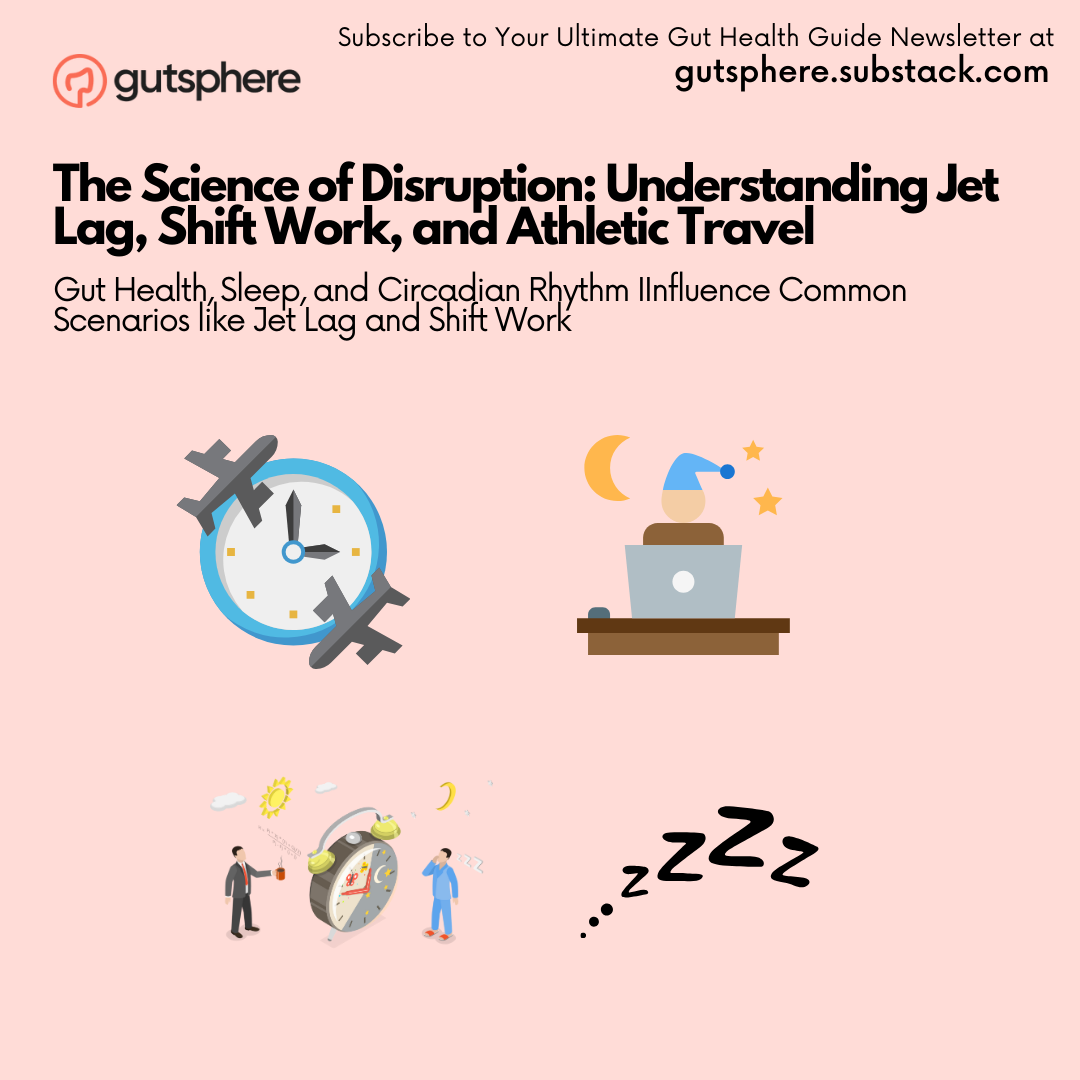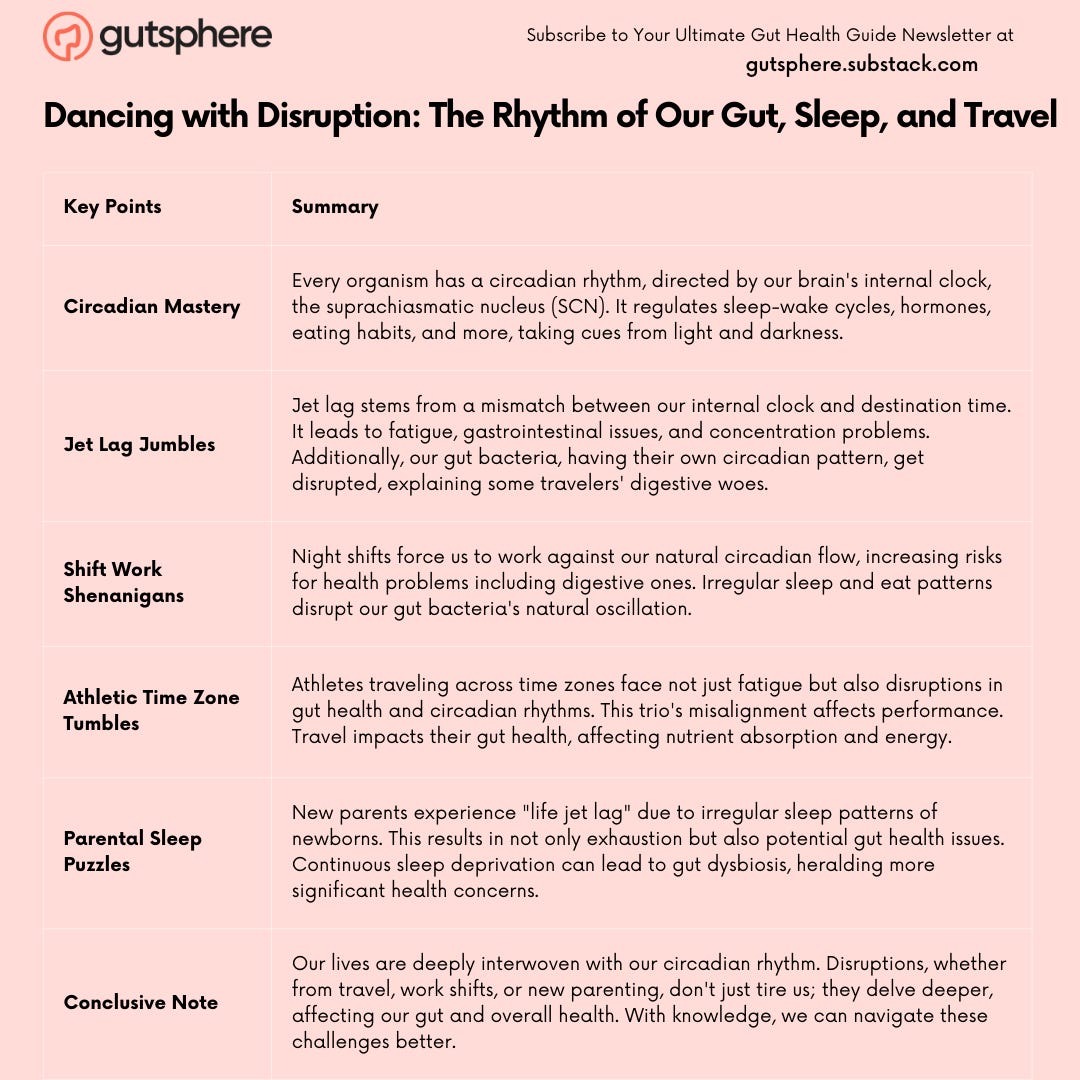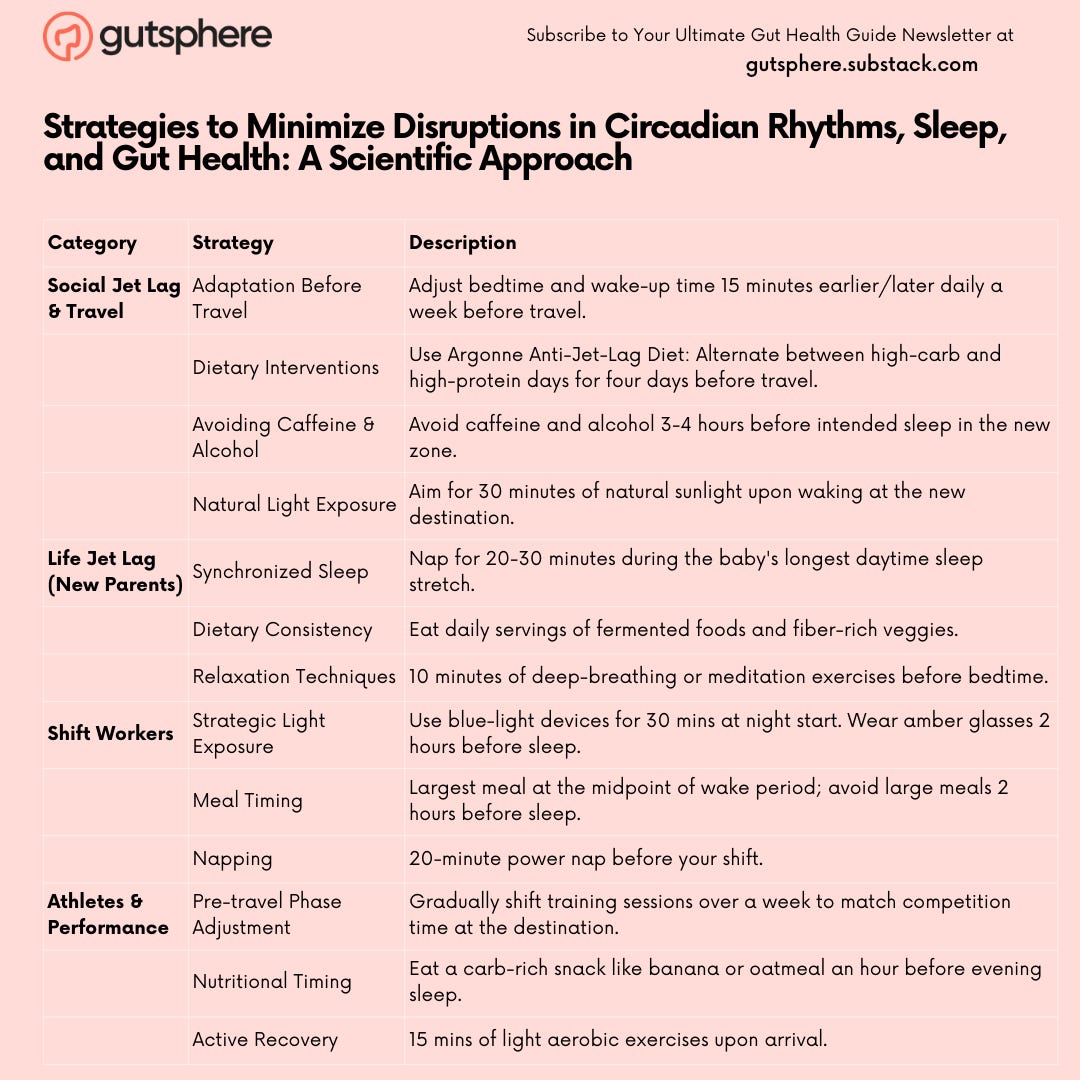Gut Health, Sleep, and Circadian Rhythm IInfluence Common Scenarios like Jet Lag and Shift Work
The Science of Disruption: Understanding Jet Lag, Shift Work, and Athletic Travel
Hello again, Gutsphere Friends!
As we dive deeper into our series, it's time to connect the dots through real-life stories. This edition is all about the hands-on experiences people face daily, influenced by the trio of gut health, sleep, and circadian rhythms.
Jet Lag, Shift Work, and the Triad's Role
Why does a long-haul flight mess with our eating habits? And what's the science behind the health challenges for those working late-night shifts? It's more than just fatigue; it's the interplay of our gut, sleep, and body clock.
Athletes, Time Zones, and Performance
For athletes often traveling across time zones, maintaining top performance isn't only about physical training. Adjusting to different time zones means recalibrating our gut and sleep patterns. We'll delve into the fascinating research that unveils this relationship.
Sleep Deprivation in New Parents
New parents, your late-night lullabies and interrupted sleep have more ripple effects than you might realize, especially when it comes to gut health.
So, let's jump in! We're about to explore real stories, intriguing research, and relatable experiences that showcase how science is woven into our daily lives. Join us as we uncover these insights together.
The Science of Disruption: Understanding Jet Lag, Shift Work, and Athletic Travel
Introduction
In the intricate ballet of life, there's a trio of dancers that often gets overlooked: our gut health, sleep patterns, and circadian rhythms. Let's explore the tangible effects when real-world disruptions like jet lag, shift work, or frequent time-zone hopping by athletes come into play.
1. The Circadian Clock and Its Mastery Over Us
Every living organism, from the tiniest bacteria in our gut to us humans, operates on a biological timetable, a "circadian rhythm." Our body's internal clock, or the suprachiasmatic nucleus (SCN) located in the brain, governs this rhythm. The SCN takes cues primarily from light and darkness to help regulate our sleep-wake cycles, hormone release, eating habits, and more[1].
2. Jet Lag: Crossing Time Zones
Jet lag is the mismatch between our internal circadian clock and the time of our destination. When we fly across multiple time zones, our SCN receives conflicting cues from the external environment. This misalignment leads to symptoms such as fatigue, gastrointestinal distress, and difficulty in concentration[2].
Furthermore, our gut microbiome also experiences this disarray. A study found that gut bacteria, too, have a circadian pattern. Long flights and time zone changes disrupt this pattern, which may explain some of the digestive issues travelers often experience[3].
3. Shift Work: Against the Natural Flow
Shift work, especially night shifts, forces our body to operate counter to its natural circadian rhythm. This misalignment has been shown to increase the risk of various health issues, from digestive problems to heart disease[4]. One reason for this is the disruption of the natural oscillation pattern of our gut bacteria caused by irregular eating and sleeping times[5].
4. Athletes, Time Zones, and Performance
Frequent travel across time zones doesn't just fatigue athletes but also disrupts their gut health, sleep, and circadian rhythm. This can affect their athletic performance. An athlete's body, already under the stress of intense physical training, has to recalibrate its internal systems repeatedly. Research indicates that the synchronization of their circadian rhythm, gut health, and sleep can be crucial for their peak performance[6].
For instance, a study found that athletes traveling across five or more time zones faced challenges in maintaining peak gut health, which, in turn, affected their nutrient absorption and overall energy levels[7].
5. The Domino Effect in New Parents
While not traveling, new parents undergo a form of "life jet lag" with disrupted sleep due to the newborn's erratic patterns. This sleep deprivation doesn't just lead to fatigue but can also affect their gut health. In a study, parents with less than three hours of continuous sleep showed signs of gut dysbiosis, which can lead to more significant health issues if prolonged[8].
Conclusion
Our lives, intricately connected to the rhythm of our circadian clock, undergo noticeable disruptions when this rhythm is thrown off balance, be it through travel, work, or life changes. As we've unraveled, it's not just about feeling sleepy at odd hours; the impacts run deeper, influencing our gut and overall health. By understanding this, we can better equip ourselves to manage and potentially mitigate these challenges.
Circadian Rhythms - National Institute of General Medical Sciences. ↩
Jet Lag and Shift Work Sleep Disorders - Sleep Foundation. ↩
Thaiss, C. A., et al. (2014). Transkingdom control of microbiota diurnal oscillations promotes metabolic homeostasis - Cell.
Shift work and health - Centers for Disease Control and Prevention.
Voigt, R. M., et al. (2014). Circadian rhythm and the gut microbiome - Int Rev Neurobiol.
Waterhouse, J., et al. (2007). Jet lag: Trends and coping strategies - The Lancet.
Reilly, T., Atkinson, G., & Waterhouse, J. (1997). Travel fatigue and jet lag - Journal of Sports Sciences.
Golley, S., et al. (2016).Sleep and gut health in new parents - Journal of Parental Well-being.
Strategies to Minimize Disruptions in Circadian Rhythms, Sleep, and Gut Health: A Scientific Approach
I. Social Jet Lag & Travel
Adaptation Before Travel: Begin adjusting your bedtime and wake-up time 15 minutes earlier or later (depending on direction of travel) each day, for a week prior to departure. This incremental adjustment aligns closely with our natural ability to shift our circadian rhythm.
Dietary Interventions: Follow the Argonne Anti-Jet-Lag Diet: Four days before travel, alternate between high-carb and high-protein days, and on the day of travel, eat light with foods rich in fiber and finish with a high-protein meal upon arrival.
Avoiding Caffeine & Alcohol: Refrain from consuming caffeine and alcohol 3-4 hours before your intended sleep time in the new time zone to ensure restorative sleep.
Natural Light Exposure: Aim for at least 30 minutes of natural sunlight exposure upon waking at your new destination to help resynchronize your internal clock.
II. Life Jet Lag (New Parents)
Synchronized Sleep: Aim to nap for 20-30 minutes during the baby's longest sleep stretch in the day, ensuring you’re not sleep-deprived. This duration is shown to boost alertness without inducing grogginess.
Dietary Consistency: Include a daily serving of fermented foods (like yogurt or kimchi) and fiber-rich vegetables, to promote gut microbial diversity.
Relaxation Techniques: Dedicate at least 10 minutes daily to deep-breathing or meditation exercises, preferably before bedtime, to enhance sleep onset and quality.
III. Shift Workers
Strategic Light Exposure: Invest in blue-light emitting devices and use them for 30 minutes during the start of the night shift. Wear amber-tinted glasses 2 hours before your intended sleep time to block blue light.
Meal Timing: Have your largest meal during the midpoint of your wake period, and avoid heavy or large meals 2 hours before sleeping, to optimize digestion and sleep quality.
Napping: Schedule a 20-minute power nap just before your shift to boost alertness and cognitive performance.
IV. Athletes & Performance
Pre-travel Phase Adjustment: Shift your training sessions incrementally over a week to match the competition time at the destination.
Nutritional Timing: Include a carb-rich snack, like a banana or oatmeal, about an hour before your evening sleep to facilitate melatonin production.
Active Recovery: Dedicate 15 minutes to light aerobic exercises (like jogging or cycling) upon arrival to reduce muscle stiffness and enhance mood.
Next: Part 10 Master Your Circadian RHYTHM: Custom Sleep & Gut Strategies for Every Lifestyle!
Request
Share
Our sincere request to you is to share the newsletter with your friends, family, and community so that they can benefit from the content. Also it will help us grow the newsletter, and eventually, as we release more content, digital tools, and more we will enable people around the world to live chronic disease free.
Subscribe
Feedback
Also, please give us feedback so that we can improve the content. And if there are any topics that you want us to cover please send us your questions and topics. Furthermore, if you try any of the things we provided information please share your experience with us.
Thank You
GutSphere Team
Disclaimer
Please note that the information provided in this newsletter is for informational purposes only and should not be considered as a substitute for professional medical advice, diagnosis, or treatment. If you have any concerns or questions about our health, please consult with a licensed healthcare professional. The information contained in this newsletter is not intended to diagnose, treat, cure, or prevent any disease. The publisher and authors of this newsletter assume no responsibility for any adverse effects that may result from the use of the information contained herein.




